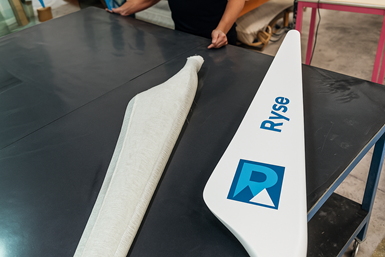Verretex SA (Lausanne, Switzerland), an EPFL spin-off developed regenerated glass fiber textiles, and Ryse Energy (Castalla, Spain), a global manufacturer of small wind turbines and hybrid off-grid systems, have announced the successful completion of a pilot study demonstrating that Verretex’s 100% recycled glass fiber textile can be used as a drop-in replacement for conventional virgin glass fiber fabrics in the manufacture of wind turbine blades.
The pilot was conducted at Ryse Energy’s Spanish manufacturing facility, led by Neil Baxter, Ryse’s technical composite specialist. The project successfully demonstrated that Verretex’s recycled textile could be processed using Ryse’s existing blade layup and curing methods with no tooling or cycle time modifications. The final product also meets IEC 61400‑2, a compliance standard for safety and durability, which Ryse’s small wind turbines are designed for.
Wind turbine blade comparison.
“We are constantly evaluating ways to reduce our carbon footprint without sacrificing performance,” says Baxter who spearheaded the pilot in Spain. “Our team was able to integrate Verretex’s recycled textile seamlessly, and the resulting test blades met the strength and durability requirements essential for wind turbine performance. This shows the real-world potential of recycled composites in renewable energy manufacturing.”
Verretex regenerates textiles from end-of-life and production scrap glass fibers to create virgin-like, low-carbon materials that fit existing production, without requiring the energy-intensive remelting of glass fiber. The significance of this development is backed by a recent life cycle assessment performed by Tech-Fab Europe, which revealed that the production of glass fiber itself is responsible for 89% of the carbon footprint of the final fabric, from raw material extraction to the factory gate .
Following the success of this Spain-based pilot, Verretex is planning to scale its production capacity to meet customer demand and bring costs in line with industry standards. once volumes and price allow, Ryse Energy plans to integrate these circular materials across its global footprint in Spain, Europe and the U.S., moving into scaled production on turbine models.







 Lu public network security: 37140202000173
Lu public network security: 37140202000173



